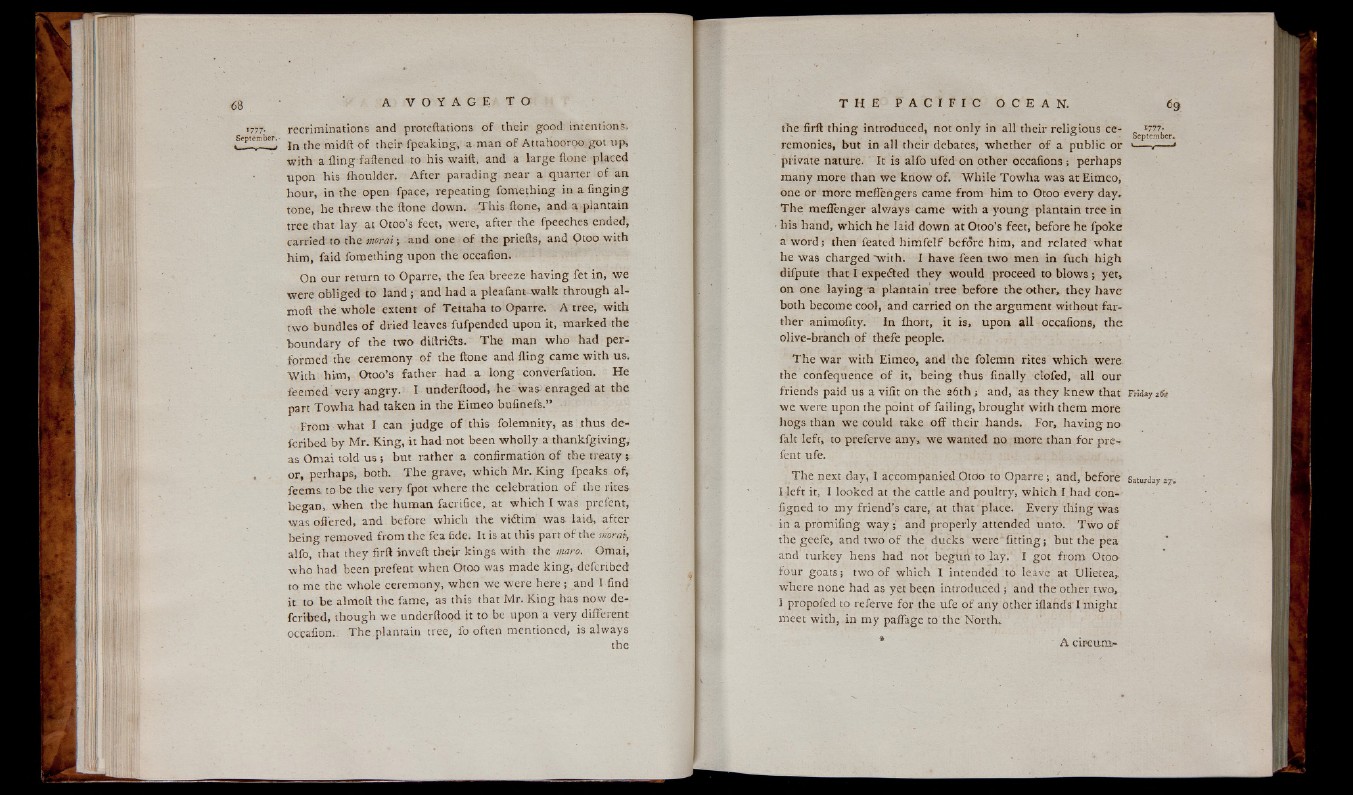
>777- recriminations and proteftations o f their good intentions.
SepKmner.- ^ ^ midft o f the ir fpeaking, a man o f Attahooroo got tip,
•with a fling fattened to his waift, and a large ftone placed
upon his fhoulder. A fte r parading near a quarter o f an
hour, in the open fpace, repeating fomething in a finging
tone, he threw the ftone down. T h is ftone, and a plantain
tree that la y at Otoo’s feet, were, after the fpeeches ended,
carried to the morai; and one o f the priefts, and 9 t0° with
him, faid fomething upon the occafion.
On our return to Oparre, the fea breeze having fet in, we
were obliged to land ; and had a plea fan t w a lk through al-
moft the whole extent o f Tettaha to Oparre. A tree, with
tw o bundles o f dried leaves fufpended upon it, marked the
boundary o f the two diftri&s. T h e man who had performed
the ceremony o f the ftone and fling came w ith us.
With him, Otoo’s father had a lo n g converfation. He
feemed ve ry angry. I underftood, h e was- enraged at the
part T owh a had taken in the Eimeo bufinefs.”
From what I can ju d g e o f this folemnity, as thus de-
fcribed by Mr. K in g , it had not been w h o lly a thank fg ivin g,
as Ornai told us ; but rather a confirmation o f the treaty »
or, perhaps, both. T h e grave, w hich Mr. K in g fpeaks of,
feems to be the very fpot where the celebration o f the rites
began, when the human facrifice, at w hich I was prefent,
was offered, and before which the vidfim was laid, a fter
b eing removed from the fea fide. It is at this part o f the morai,
alfo, that they firft inveft their kin gs with the maro. Omai,
who had been prefent when Otoo was made k in g, defcribed
to me the whole ceremony, when we were here ; and I find
it to be almoft the fame, as this that Mr. K in g has now defcribed,
though we underftood it to be upon a very different
occafion. The,plantain tree, fo often mentioned, is always
the
the firft thing introduced, not only in all their religious ce- *777.
< 0 S e p tem b e r .
remonies, but in all their debates, whether o f a public o r 1— ,--- •
private nature. It is alfo ufed on other occafions ; perhaps
many more than we k n ow of. While Towha was at Eimeo,
one or more meflengers came from him to Otoo every day.
T h e meflenger always came w ith a yo u n g plantain tree in
• his hand, which he laid down at Otoo’s feet, before he fpoke
a word; then feated h im fe lf before him, and related what
he was charged "with. I have feen two men in fuch h ig h
difpute that I expected the y wou ld proceed to blows ; yet,
on one la y in g a plantain' tree before the other, they have
both become cool, and carried on the argument without farther
animofity. In fhort, it is, upon a ll occafions, th e
olive-branch o f thefe people.
T h e war w ith Eimeo, and the folemn rites w hich were
the confequence o f it, b e in g thus finally clofed, all our
friends paid us a vifit on the 36th ; and, as they kn ew that Friday
we were upon the point o f failing, brought with them more
hogs than w e could take o ff their hands. For, h a v in g no
fait left, to preferve an y , w e wanted no more than fa r prefent
ufe.
The next day, I accompanied Otoo to Oparre; and, before Saturd ayzj,
I le ft it, I looked at the cattle and poultry, w h ich I had con-'
figned to m y friend’s care, at that place. Every thing was
in a promifing w a y ; and properly attended unto. Tw o o f
the ge efe , and two o f the ducks w e r e ' fittin g ; but the pea
and turkey hens had not begun to lay.' I got from- Otoo
four goats; two o f w hich I intended to leave at Ulietea,
where none had as yet been introduced ; and the other two,
I propofed to referve for the ufe o f any other iflands Im igh t
meet with, in my paflage to the North.
* A cireumi